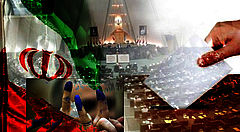Friday Imams Anxious Over Next Majlis Elections
» Ay. Khamenei’s Appointees and their Nightmare of a Repeat of 2009
Just over a year remains for two important national elections in Iran, one for the parliament and the other for the Assembly of Experts on Leadership which constitutionally determines the supreme leader of the country and monitors his work. But news reports in Iran indicate that appointee’s of ayatollah Khamenei to Friday prayers are already setting the stage for these two elections and issuing warnings. The warnings speak of a new round of protests against the government similar to those in 2009 that the regime calls sedition.
This Friday, the head of the national Friday prayer organization spoke at Tehran University’s Friday congregational prayers and said, “Sedition is a domestic issue and springs up from inside a revolutionary society. It battles the revolution and its values. Therefore, we must enlighten and continuously address the issue that the enemy may have plans to neutralize people who are active and involved.”
Cleric seyed Reza Taghavi continued, “Many preparations have been made for the elections next year. People therefore must be alert because the preparations of the sedition must be paid attention to. Every sedition act stems from bases that have been prepared after which it appears as a social movement. Therefore, our people must be aware about next year’s elections.”
Taghavi is also a member of Jame Rohaniyat Mobarez (the conservative Combatant Clergy Association) who holds regular sessions for the “unity of principlists” (principlists are a group of hardline conservatives) in the upcoming elections. He calls on the public to be alert so that “seditionists do not create cells in government agencies.” He also praises the parliament for confronting Hassan Rouhani’s administration.
According to him, “Cabinet ministers, the president and our officials have transparently specified their position vis-à-vis the seditionists and yet we must be vigilant so that seditionists do not change their appearance. If our Majlis is sensitive to some personalities it is because it is its religious and national duty to be so to prevent seditionists from infiltrating key positions.”
Tehran’s Friday imam Kazem Sedighi spoke after Taghavi on Friday. He too spoke of “seditionists” and said, “Seditionists already have plans for the parliament and the experts assembly, and use resources that do not belong to them to prepare grounds for (the takeover of the) Majlis and to have a presence in the experts assembly so that they can bring down the regime.” He went further and said, “If the onslaught of the seditionists is not cured with decisive decisions by officials then a high cost will be paid by the regime. Of course if people’s presence in the December 30 demonstration condemned the seditionists indicating that they are determined to resist the sedition.”
Ayatollah Khamenei’s representative in the Revolutionary Guards force also spoke last week to a group of guardsmen and Basij para-military members in Kerman and talked of the importance of next year’s parliamentary and assembly of experts elections and made the claim that “seditionists” continued with their plots and plans. Cleric Ali Saeedi said, “The key sedition view continues and what changes are its actors. How votes are cast is a divine trust. People cannot change a haram (religiously forbidden) person to a kosher one through a vote. They can however vote to a member of the city council or the president who are committed to divine laws.”
He continued, “People should know that purposeful voting is most important. Who is voted into the experts assembly is important. Who will lead the assembly is also important. Therefore, voting is a heavy responsibility.”
The elections to the next Majlis and the Assembly of Experts will take place in March of 2016. Since Hassan Rouhani won the presidential vote in 2013, appointees of Iran’s supreme leader have been claiming that reformers, who supported Khatami in 2013, are working and planning to gradually take control of the parliament and the assembly of experts. Just two weeks ago, the official newspaper of the Revolutionary Guards’ political office also wrote on this and even said that electoral Rouhani’s victory is the beginning of the efforts of reformers to return to power, something it vehemently opposes.
Among the key reasons why such a concern has been elevated are possibly Khamenei’s old age and rumors that he suffers from cancer, the health of two other senior clerical leaders Ahmad Janati and Mesbah Yazdi both of whom spent time in hospitals last year, and absence of new younger clerics joining the camp that supports the notion of an absolute supreme leader. The regime has not easily found a successor to lead the Assembly of Experts since Kani’s practical absence from the scene.
A booklet that circulated widely in Ghom last month and some newspaper published columns on it warns that in the next decade, there will be a shortage of cadres for the rule of the velayate faghih – supreme clerical leadership - in the Islamic republic, unless it successfully manages current elections. The report also writes that the victory of Rafsanjani’s camp in the last presidential election was not an accident and may even happen again in future elections.
Concerns about rule by velayate faghih are raised at a time when the composition of the Majlis too has changed since Rouhani’s presidency. While hardline conservatists - who call themselves Principlists – constitute the largest group in the Majlis they are now divided and have lost some members to the point that made Mohammad Reza Bahonar (a presiding member of the Majlis) say, “the line between reformers and principlists has blurred.” Last year, he even used the word “danger” for the changes that were taking place in the Majlis and said, “With the arrival of a new administration, the freeze on the reformers is melting and some seditionists want to start a new sedition.”



